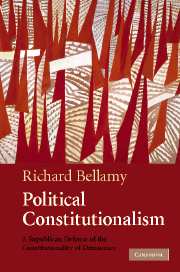Book contents
- Frontmatter
- Contents
- Preface and acknowledgements
- Introduction: legal and political constitutionalism
- PART I Legal constitutionalism
- 1 Constitutional rights and the limits of judicial review
- 2 The rule of law and the rule of persons
- 3 Constitutionalism and democracy
- PART II Political constitutionalism
- Conclusion
- Index
2 - The rule of law and the rule of persons
Published online by Cambridge University Press: 22 September 2009
- Frontmatter
- Contents
- Preface and acknowledgements
- Introduction: legal and political constitutionalism
- PART I Legal constitutionalism
- 1 Constitutional rights and the limits of judicial review
- 2 The rule of law and the rule of persons
- 3 Constitutionalism and democracy
- PART II Political constitutionalism
- Conclusion
- Index
Summary
When judges criticise legislatures and governments they typically do so in the name of the rule of law. Unfortunately, politicians do likewise when they attack judicial activism. The first identify the rule of law with the judiciary's authority to determine the state of the law in a given case, to pass sentence and to review legislation for its compatibility with prevailing legal norms, including constitutional rights. They see attempts by politicians to contest or interfere with these powers as undermining the integrity of the legal system. The second, however, associate the rule of law with the right of a legally authorised government to pass laws according to the due formalities and to have them obeyed. They regard judicial moves to reinterpret or question duly passed laws as usurping the government's right to legislate. On this view, the prime danger to consistency in the legal process comes from courts aspiring to make the laws rather than simply applying them. Meanwhile, people's ability to influence and contest legislation via the ballot box also gets eroded. Given the often self-serving and apparently incompatible character of these two positions, it is perhaps small wonder that many theorists have regarded the concept as at best ‘essentially contested’, at worst no more than a ‘meaningless … self-congratulatory rhetorical device’.
As the two accounts outlined above indicate, different views of the respective powers of the legislature and the judiciary, and of the nature of their separation, lie at the heart of debates regarding the rule of law.
- Type
- Chapter
- Information
- Political ConstitutionalismA Republican Defence of the Constitutionality of Democracy, pp. 52 - 89Publisher: Cambridge University PressPrint publication year: 2007



